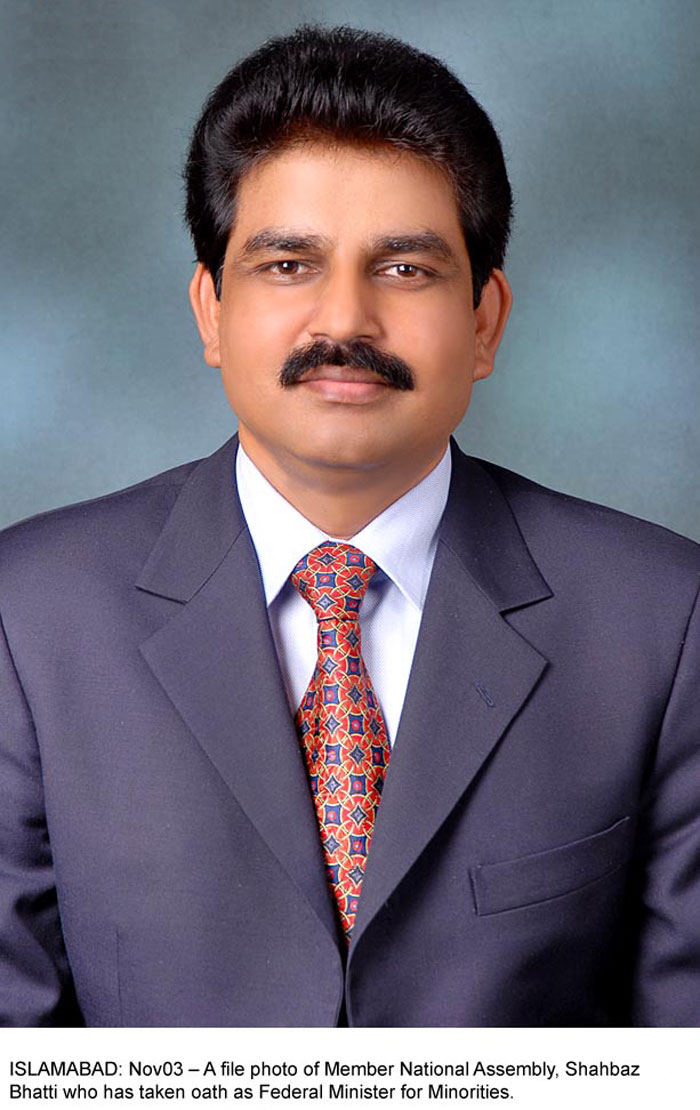Shahbaz Bhatti (1968-2011): Pakistan’s contemporary martyr
Babette Francis - AD 2000, May 2011
When I observe Catholics emerging from Sunday Mass, they seem cheerful but placid, and I wonder if I am living in a parallel universe. Do they get the emails I get from Christians in Crisis, Aid to the Church in Need, and the Barnabus Fund about the current martyrdom of Christians? Why aren’t we hearing from the pulpit about the massacres of Catholics in Iraq, the killing of Copts in Egypt and persecution of Christians by Pakistan’s blasphemy laws?
Perhaps I feel more intensely about this because I was born in India before the partition of that country into India and Pakistan, and I am devastated by what is happening in Pakistan — so different from the secular democracy envisaged by its founder, Muhammad Ali Jinnah.
The present Pakistani (coalition) government headed by the Pakistan Peoples Party is ineffectual in stopping the killings by Islamist fundamentalists with the situation spiraling out of control and the plight of Christians dire.
Murderous zealots
It is not just Christians, but
moderate Muslims: the former Prime
Minister, Benazir Bhutto, wife of
current Pakistan President, Asif Ali
Zardari, was assassinated in 2007. But
Zardari seems unable to deal with the
murderous zealots.
Two years ago Christian farm labourer, Asia Bibi, mother of two, following a dispute with a Muslim neighbour, was charged by her with blasphemy against the Muslim religion. Sentenced to death, Asia has been in prison since.
Salman Taseer, Governor of
Punjab and an enlightened Muslim,
visited her in prison and spoke against
the blasphemy laws which he said
were used to settle scores between
neighbours and to harass Christians.
Taseer was assassinated by his own
bodyguard in January 2011.
Instead of provoking horror, the
arrested bodyguard was showered
with rose petals by supportive crowds,
and praised by clerics with hundreds
of lawyers offering to defend him. His
assassin, Mumtaz Qadri, has achieved
celebrity status, and the government
abandoned attempts to repeal the
blasphemy laws.
Two months later, (Clement)Shahbaz Bhatti, (pictured at right), a Catholic who was the Minorities Minister in Pakistan’s cabinet, was shot by a gunman outside his mother’s Islamabad home because of his unrelenting opposition to Pakistan’s blasphemy laws and the injustices and intolerance it encouraged. Besides representing minorities, Bhatti also stood for those subscribing to the vision of Pakistan’s founder, Jinnah, characterised by pluralism, freedom of religion and the rule of law.
Born to Catholic parents in Lahore, Bhatti was one of six children. His father, Jacob, was a teacher. In his teens, Bhatti experienced the spiritual awakening to which he attributed his life’s work, saying he had decided to give his life to serve others, as he believed Christ had done for him.
Bhatti had master’s degrees in public administration and political science and a diploma in international relations. He founded the Christian Liberation Front (CLF) in 1985 to restore the rights of Pakistan’s minorities and promote tolerance.
Pakistan’s population is 185 million: 75% are Sunni Muslim, 20% Shia Muslim and 4-5% are classed as other religions, including Hindus, Christians, Sikhs, Buddhists and Parsis. The deteriorating treatment of non-Muslims began under the regime of General Zia-ul-Haq (1977-88).
Undeterred by death threats and state intimidation Bhatti undertook everything from prison visits and aid distribution to political advocacy and legal support. In 1992 CLF launched the first national campaign against the blasphemy laws. In 2002, Bhatti and others founded the All Pakistan Minorities Alliance (APMA) and was elected to lead this coalition of minority representatives and NGOs.
APMA convinced the government to replace the separate electorate system, described by some as “religious apartheid”, under which religious minorities could vote only for candidates of their own faith. Bhatti received international awards for his leadership of CLF and APMA, but he loved working on the frontlines of activism. When Christian villagers of Charsadda, in fear of attack from local extremists, called for help, he travelled to the north-west to be with them. When eight were killed and more than 100 houses destroyed in 2009 in Gojra, Punjab, Bhatti (then a government minister) refused to leave the police station until the crimes were registered.
Bhatti was elected to the National Assembly in 2008 and made federal minister for Minorities Affairs, a cabinet-level position for the first time. He was the only Christian minister.
His achievements included a 5% minorities quota in government jobs, the first minority seats in the Senate and a 24-hour minorities helpline. Bhatti knew there was a high risk he would be assassinated and so decided not to marry.
Authentic martyr
Catholic bishops in Pakistan
hailed Bhatti as an “authentic martyr”
and in Rome Cardinal Jean-Louis
Tauran, president of the Pontifical
Council for Inter-Religious Dialogue,
agreed that Bhatti died as an
“authentic martyr”. At a Mass for him,
the Cardinal revealed that in their last
conversation in November 2010,
Bhatti said: “I know that I will die assassinated,
but I lay down my life for
Christ and for inter-religious dialogue.”
Asia Bibi is still in prison, also fearing assassination. Another Catholic, Qumar David, imprisoned for blasphemy, has died in prison under suspicious circumstances, and the bishops are asking for an investigation. Shahbaz Bhatti, 42, is survived by his mother, four brothers and a sister.
A glimmer of hope in the darkness enveloping Pakistan is that the government has appointed Shahbaz’s brother, Paul, a doctor, as adviser to the Prime Minister on Minorities, and hopefully later to a Cabinet position. Paul Bhatti said he would continue his brother’s mission of inter- faith harmony in Pakistan.
